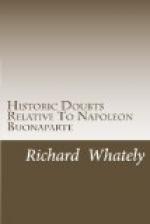[14] This doctrine, though hardly needing confirmation from authority, is supported by that of Hume; his eighth essay is, throughout, an argument for the doctrine of “Philosophical necessity,” drawn entirely from the general uniformity, observable in the course of nature with respect to the principles of human conduct, as well as those of the material universe; from which uniformity, he observes, it is that we are enabled in both cases, to form our judgment by means of Experience: “and if,” says he, “we would explode any forgery in history, we cannot make use of a more convincing argument, than to prove that the actions ascribed to any person, are directly contrary to the course of nature....
“... The Veracity of Quintus Curtius is as suspicious when he describes the supernatural courage of Alexander, by which he was hurried on singly to attack multitudes, as when he describes his supernatural force and activity, by which he was able to resist them. So readily and universally do we acknowledge a uniformity in human motives and actions, as well as in the operations of body.”—Eighth Essay, p. 131, 12mo; p. 85, 8vo, 1817.
Accordingly, in the tenth essay, his use of the term “miracle,” after having called it “a transgression of a law of nature,” plainly shows that he meant to include human nature: “no testimony,” says he, “is sufficient to establish a miracle, unless the testimony be of such a nature that its falsehood would be more miraculous than the fact which it endeavours to establish.” The term “prodigy” also (which he all along employs as synonymous with “miracle”) is applied to testimony, in the same manner, immediately after; “In the foregoing reasoning we have supposed ... that the falsehood of that testimony would be a kind of prodigy.” Now had he meant to confine the meaning of “miracle,” and “prodigy,” to a violation of the laws of matter, the epithet “miraculous,” applied even thus hypothetically, to false testimony, would be as unmeaning as the epithets “green” or “square;” the only possible sense in which we can apply to it, even in imagination, the term “miraculous,” is that of “highly improbable,”—“contrary to those laws of nature which respect human conduct:” and in this sense he accordingly uses the word in the very next sentence: “When any one tells me that he saw a dead man restored to life, I immediately consider with myself whether it be more probable that this person should either deceive or be deceived, or that the fact which he relates should really have happened. I weigh the one miracle against the other.”—Hume’s Essay on Miracles, pp. 176, 177, 12mo; p. 182, 8vo, 1767; p. 115, 8vo, 1817.
See also a passage above quoted from the same essay, where he speaks of “the miraculous accounts of travellers;” evidently using the word in this sense.
Perhaps it was superfluous to cite authority for applying the term “miracle” to whatever is “highly improbable;” but it is important to the students of Hume, to be fully aware that he uses those two expressions as synonymous; since otherwise they would mistake the meaning of that passage which he justly calls “a general maxim worthy of your attention.”




